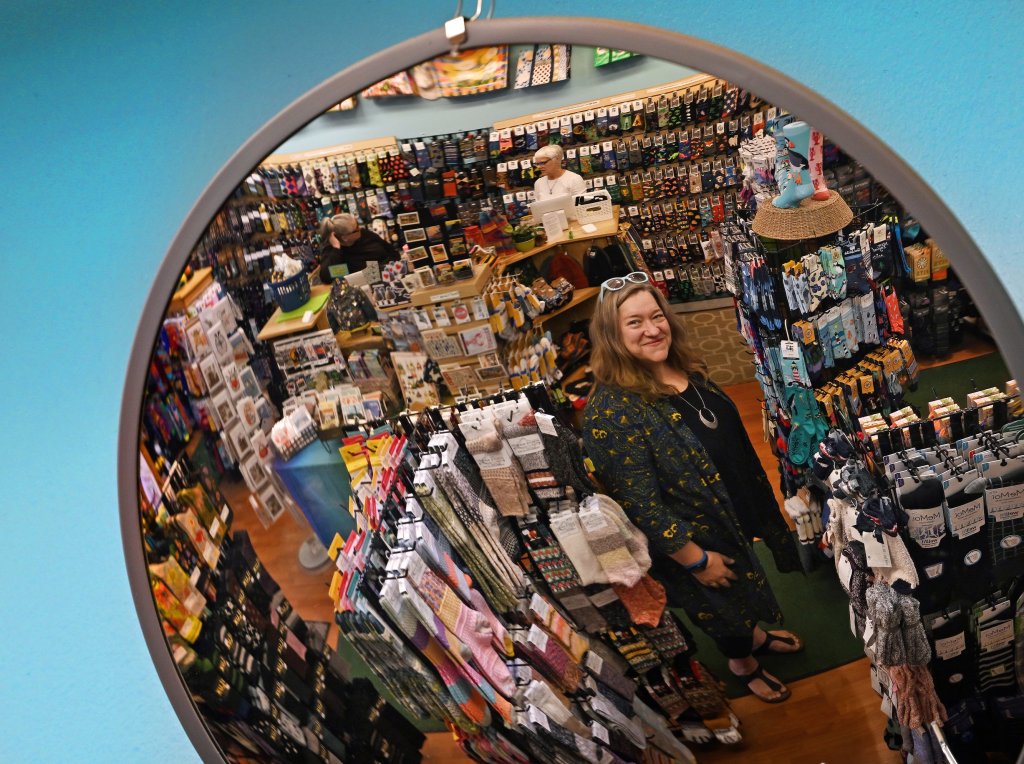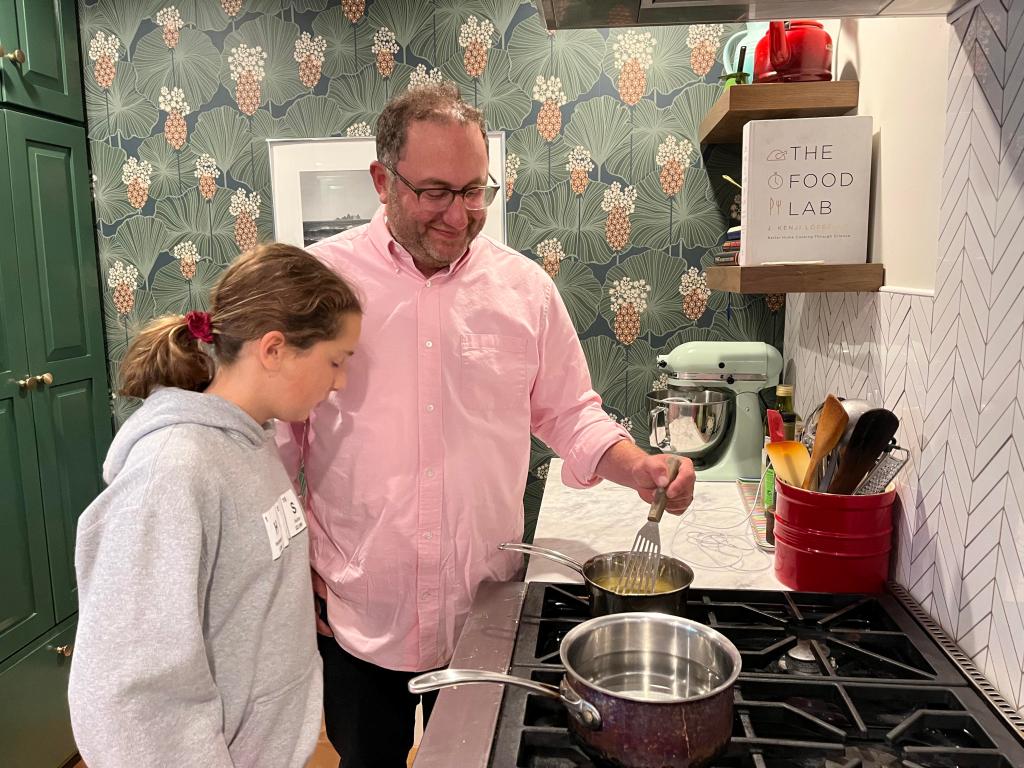Unless your misfortune is skinned-knee sized, a bowl of chicken soup, a tray of lasagna or a warm chocolate chip cookie probably isn’t going to solve it. Still, in the tumultuous, deeply divided times we are living in, food can be a small comfort.
A handful of Mainers who faced, or still face, turbulence in their personal or professional lives talked with us about their situations and what foods bring them a bit of relief. As we reported this story, the federal government shut down, local colleges confronted bomb threats, and the state’s severe drought — aided and abetted by the warming global climate — is still ongoing.
“Even if we don’t end up chatting,” a staff member at community organization MaineTransNet emailed in response to our request for an interview, “thank you for acknowledging that our staff has it pretty rough these days and could really always use a comforting treat.”
Couldn’t we all?

Hildi McKeagney, The Sock Shack
It’s probably never an easy time to own a small business, and now is no exception.
Hildi McKeagney, owner of the Sock Shack in Portland, said prohibitive tariffs have meant she’s had to eliminate a few clothing lines and reassess how she prices those she still carries. She’s also dealing with higher shipping costs and disruptions in getting merchandise, even for socks that are made in the U.S. Earlier this year, when tariffs were threatened but not yet in place, McKeagney tried to position her business for the uncertain future.
“Even though I didn’t want to buy a ton of stuff at the time, it made sense to do it,” she said. Stocking inventory in advance has allowed her business to “absorb a little bit more — for the time being.“
Other challenges lie closer to home. The Sock Shack is in the Arts District on Congress Street, a section of town where businesses and residents have complained of empty storefronts, safety concerns, drug use and public disturbances. While she is well aware of the challenges, McKeagney said she loves the location.
“I just want people to know it’s still lovely and charming downtown and to please, please visit and give it a try.”
McKeagney, a vegetarian, is an enthusiastic cook. Exactly what meal offers her comfort at the end of a tough day can vary. Often it’s socca, a Provençal cross between a pancake and a flatbread that’s made from chickpea flour. When it’s hot out, she leans into salads and dishes that don’t require the oven, like vegetables or noodles with Thai peanut sauce. “I know it doesn’t sound very comforting, but on a hot day, it’s such a relief to eat cooling foods.”
When it’s chilly, comfort means soup, regularly Hungarian Mushroom Soup (see recipe below). “Because all those aromatic elements when you’ve got something on the stove that’s simmering just kind of feed your soul,” she said.
The cheerful, whimsically stocked Sock Shack offers comforts of its own. “One of the joys of this little store is that we can brighten people’s day really easily,” McKeagney said. “Some folks are coming in feeling the weight of world events, micro and macro. And the silliness or the comfort of what we’re doing here can lift their spirits. That lifts our spirits, too.”
Will Sedlack, Presumpscot Regional Land Trust
“The real core is just uncertainty. These are tumultuous times, and you don’t know what you’re going to wake up to in the morning,” Presumpscot Regional Land Trust Executive Director Will Sedlack said when asked about his work life.
The Presumpscot land trust has been lucky, he said, with a supportive community, “incredible members” and the wherewithal to open a new preserve in Westbrook this year. “But I’ve certainly seen, with our partner organizations and other land trusts, just what it means to have federal funding cut a week before a property is supposed to close.”
The Presumpscot trust faced a small crisis itself earlier this year when the funding for a Maine Conservation Corps member set to join the nonprofit was abruptly cut. (Very abruptly, the pending employee had already moved to Maine and only got the bad news during job orientation.) The land trust has just two full-time staff members, including Sedlack, and two part-timers. So the Corps member “was going to be a substantial force multiplier in terms of what we could do in managing our land,” he said.
Eventually, the state stepped in and paid for the position, but for a time, the person that the trust was counting on to help get the new Westbrook preserve up and running, to build boardwalks and trails, was “a big question mark.”
“All the chaos is wasted money,” Sedlack said, wasted energy and community time, too, which must be spent scrambling to regroup instead of “doing more mission-central things.”
Another challenge Sedlack faces often these days is lack of civility. The issues any land trust wrestles with are big ones: “Where do you develop? Do you develop at all? Those questions get at a real core of, what do we want to see our communities look like in the future?”
Of late, though, Sedlack has found that people begin such conversations from a place of anger. “The temperature is just so high.”
High temperatures are bad news for solving community problems, but just what you want to make pizza. Sedlack cooks dinner seven nights out of seven. It’s how he decompresses. Any weekend you can find him making pizza for family and friends in his new outdoor oven. He likes to devise creative toppings, like a recent bacon, pesto, cherry tomato and mozzarella pizza. He likes to observe subtle differences in the doughs he’s mixed. “It becomes a weekly science experiment that happens to be really delicious,” he said.
Weeknight meals tend to be set-it-and-forget-it for Sedlack, but that sort of relaxing, warm-hug cooking doesn’t offer him the kind of culinary comfort he seeks. For that, “cooking has to add something to my battery for the week,” he said. “There’s a nourishment I need from it. After the process of making pizza, I feel excited. I’m revived.”
Selena Juneau-Vogel, government contractor
Selena Juneau-Vogel spent six years working for the federal General Services Administration and planned on staying another five to 10 years. She liked her job. When other federal agencies were seeking to upgrade their websites or install more efficient digital services, they’d call in her team for help.
On March 1, the Department of Government Efficiency “rolled in on a Saturday morning at 1 a.m., sent us an email and eliminated our entire division. So that was confusing and frustrating,” Juneau-Vogel said, then paused, “ironic, and really tough back in February and March.”
The family canceled a planned trip to Douro, Portugal, that was meant to better familiarize her husband, chef Colin Wyatt, with the cuisine as he readied to open Portuguese restaurant Douro on Thames Street in Portland (scheduled to happen thisThursday).
As these things go, Juneau-Vogel was one of the lucky ones. She quickly found a new job with a government contractor that does similar work, though she says she “hesitated if I wanted to even be anywhere near government after that experience.”
On the day we spoke, as the federal government was shutting down, Juneau-Vogel was trying to work out which projects at her new company needed to be put on pause and how to keep employees occupied. “So the challenge continues.”
Last winter, when it became apparent that Juneau-Vogel’s job was under threat, a friend suggested that she plant a big garden, warning — only half jokingly — that cuts in the federal workforce would have long-term impacts on the cost and safety of food. Juneau-Vogel took the advice “a bit to heart.”
Come spring, the family expanded their vegetable garden at their home in Portland. This summer, they’ve enjoyed harvesting homegrown eggplants (See Shortcut Eggplant Parm recipe below), tomatoes, herbs and more, and cooking, among other dishes, baba ghanoush, all sorts of pasta dishes with vegetables, and Marcella Hazan’s legendary tomato sauce.
“That process more than the dish itself,” Juneau-Vogel elaborated, “just working from something you grew and seeing the fruits of your labor, even when it’s a stressful time. Like, you’ve been trying to open a restaurant and it’s been delayed and you haven’t seen the fruits of your labor, or working in the federal government and you’re not seeing the fruits of it. But here’s a tomato. Here’s an actual fruit of my actual labor.”

Mike Ranen, Bowdoin College
President Trump makes no secret of his desire to reshape American higher education. In just eight months, his administration has withheld federal research dollars, restricted visas for international students, and been sharply critical of university policies on DEI and responses to student pro-Palestinian activism.
“The hardest part right now is just making sure that we all understand how any changing regulations can impact our students, faculty and staff,” said Mike Ranen, associate dean for academic administration at Bowdoin. “What’s challenging is that the information is changing all the time.”
Ranen oversees the college’s departments, libraries and museums, and is involved in budgeting, college life issues and securing research grants. Even during ordinary campus times, the responsibilities sound daunting. The morning we spoke, he was trying to assess how a pending government shutdown could affect researchers at Bowdoin.
Cooking dinner, then sitting down to eat with his wife and two children, is the most important part of his day, he said, a stretch he described as a “deep breath.”
“After a challenging day of work, being in my kitchen with my family is what gives me peace and comfort,” Ranen said. “Cooking started as a hobby of mine, but now it really has become a lifeline and a way to decompress and also reconnect.”
One recipe he returns to often is his paternal grandmother’s spinach pie (see recipe below). It’s a cousin to spanakopita that uses bread crumbs or matzo meal in place of the usual filo dough. His grandmother, a Sephardic Jew, died long ago, and Ranen said he’s spent the better part of two decades trying to recreate her recipe, though he gives it “a more cheffy spin.”
“It brings me back to my roots as well, which is another layer of comfort.”
Mulenga Mutapa, social worker/medication technician

For the last three years, social worker Mulenga Mutapa worked with some 30 families from Congo and Angola, helping them to settle in Sanford. As multicultural outreach worker for York County Community Action Corporation, she guided these families as they registered their children for school, applied for general assistance and requested work permits.
Mutapa, who grew up in Zambia, knows firsthand what it’s like to be a stranger in a new land. She joined her then-fiancé in the United States in 2011. When immigrant families work with someone with “lived experience,” she said, “they feel more comfort.”
Her work was never just a job. In Zambia, she worked for a NGO helping disseminate information about HIV, and she worked for the country’s largest cement manufacturer helping workers who’d developed breathing problems get compensation. In Sanford, as with every job she’s ever held, her passion was for helping people.
On June 30, the federal grant that funded her job was not renewed. Mutapa had been “very hopeful” that it would be, in recognition of the work she’d already done and the work that remained to be done. “One aspect that people overlook — you can settle in, but it’s the inclusion that matters. So for me to leave those people hanging like that is heartbreaking.”
“How do they feel included in the community was one thing that I was looking forward to continue to do with them,” she said. “You cannot hold someone’s hand forever, but at least, like, another two years to see that they are where they’re supposed to be.”
Instead, Mutapa has gone back to work as a medication technician for now. It pays the bills, but it doesn’t fill her heart. Meanwhile, she treasures memories of cooking with the Congolese and Angolan families. When they arrived in Sanford, before they’d found housing, the families sheltered in a church. Every Tuesday and Friday, they’d gather and cook African meals together.
Mutapa, who describes herself as crazy about the food of Africa, always joined in.
“Food was part of the comfort zone,” she said. “A 100% big-time part of it.” Whether it’s beans, beef or cassava, “the moment you cook it in the African way, it drives you back to the feeling you’re closer to home.”
She could never leave these gatherings empty-handed. Although these families faced many serious challenges, they always remembered to pack up food for her to take home to her husband and sons in Lyman. “It’s part of our tradition,” Mutapa said. “You can’t leave without a dish.”
Hungarian Mushroom Soup
Hildi McKeagney riffs off the “Moosewood Cookbook” recipe, given here, when she makes mushroom soup. Here are her further tips: “I take some liberties and tweak things, more mushrooms and onion, a little less flour, coconut milk in place of milk and sour cream, and often I like to throw in some barley for a very hearty version. It smells fantastic as it’s coming together, has a really lovely texture and when you ladle it into your favorite bowl and cup your hands around that warm vessel, it’s like getting a reassuring hug in the form of savory soup.”
2 cups chopped onions
4 tablespoons butter
Salt
12 ounces mushrooms, slices
1 to 2 teaspoons dried dill
2 cups stock or water
1 tablespoon tamari
1 tablespoon Hungarian paprika
3 tablespoons flour
1 cup milk
1 teaspoon salt and freshly ground pepper
2 teaspoons fresh lemon juice
1/2 cup sour cream
1/4 cup chopped parsley
Saute the onions in 2 tablespoons butter in a medium skillet. Salt lightly. A few minutes later, add the mushrooms, 1 teaspoon dill, 1/2 cup stock or water, tamari and paprika. Cover and simmer for 15 minutes.
Melt the remaining 2 tablespoons butter in a large pot. Whisk in flour and cook, whisking, a few minutes. Add the milk. Cook stirring frequently over low heat — about 10 minutes — until thick. Stir the mushroom mixture and remaining stock into the pot. Cover and simmer 10 to 15 minutes.
Just before serving, add the salt, pepper, lemon juice, sour cream and, if desired, extra dill. Once you add the sour cream, be careful not to let the soup boil. Serve, garnished with parsley.
Shortcut Eggplant Parm
The recipe, from chef and restaurateur Sohla El-Waylly, is one of Selena Juneau-Vogel’s family go-to comfort food meals.
3 medium Japanese eggplants (about 1¼ lbs. total), tops trimmed and halved lengthwise
1 teaspoon kosher salt, divided
5 tablespoons extra-virgin olive oil, divided
4 garlic cloves, thinly sliced
1 teaspoon crushed red pepper
1 pint cherry tomatoes
½ cup tap water
4 oz. low-moisture, part-skim mozzarella cheese, torn into ½-inch pieces
1⅓ oz. Parmesan cheese, grated (about ⅓ cup)
⅓ cup lightly packed fresh basil leaves, torn
Short pasta, polenta, or crusty bread to serve
Preheat oven to broil with a rack in center position. Heat a large cast-iron or broiler-proof stainless steel skillet over medium high until barely smoking. While skillet heats, sprinkle the cut sides of the eggplant with ½ teaspoon of the salt.
Add 3 tablespoons of the olive oil to skillet, and swirl to coat. Quickly arrange the eggplant cut-side down in skillet. Use a spatula to firmly press eggplant down; cook, undisturbed, until lightly charred and starting to soften, about 5 minutes.
Remove the skillet from the heat and transfer eggplant to a plate; set aside. Add the remaining 2 tablespoons oil to skillet over medium heat. Add the garlic and crushed red pepper; cook, stirring constantly, until fragrant, about 1 minute.
Add the tomatoes and water to the skillet; cook, stirring occasionally, until softened, pressing with the back of spatula to burst them, 4 to 6 minutes. Sprinkle with the remaining ½ teaspoon salt.
Return the eggplant to the skillet; cook, stirring occasionally, until tender and sauce has thickened slightly, about 5 minutes. (Add more water if the skillet looks dry before eggplant is tender.) Taste sauce, and add salt if needed. Remove from heat.
Dot the top of the eggplant with mozzarella, and sprinkle with Parmesan. Transfer to oven, and broil until cheese melts and browns, 2 to 3 minutes. Top with basil; serve immediately.
Grammy’s Sephardic Spinach Pie
Recipe from Mike Ranen of Brunswick.
1 leek, white and light green parts only, chopped
1 medium onion, diced
1 large or 2 small shallots, finely diced
3 tablespoons butter, plus more to grease the pan
1 tablespoon olive oil
3 cloves garlic, minced
4 scallions, sliced, white and dark green parts separated
3 pounds frozen chopped spinach, thawed, excess water squeezed out with a kitchen towel
1 pound feta cheese, cubed or crumbled
2 cups matzo meal or panko breadcrumbs
6 eggs, beaten
1/2 cup Parmesan cheese
Preheat the oven to 375 F. Grease an 11 x 13-inch baking pan with a little butter.
Heat the butter and olive oil in a large skillet over low heat. Add the leeks, onions and shallots and sauté until soft. Add the garlic and the white parts of scallion and cook for another minute or 2. Allow the mixture to cool.
In a large bowl, add the spinach, feta, matzo meal or breadcrumbs, eggs, 1/4 cup of the Parmesan cheese, the white scallion tops and the cooled onion mixture. Mix well.
Scrap the spinach mixture into the casserole dish and press down a bit. Sprinkle with the remaining Parmesan cheese. Place in the preheated oven and bake for 45 minutes.
If the casserole isn’t brown enough, finish under the broiler for a minute.


We invite you to add your comments. We encourage a thoughtful exchange of ideas and information on this website. By joining the conversation, you are agreeing to our commenting policy and terms of use. More information is found on our FAQs. You can modify your screen name here.
Comments are managed by our staff during regular business hours Monday through Friday as well as limited hours on Saturday and Sunday. Comments held for moderation outside of those hours may take longer to approve.
Join the Conversation
Please sign into your CentralMaine.com account to participate in conversations below. If you do not have an account, you can register or subscribe. Questions? Please see our FAQs.